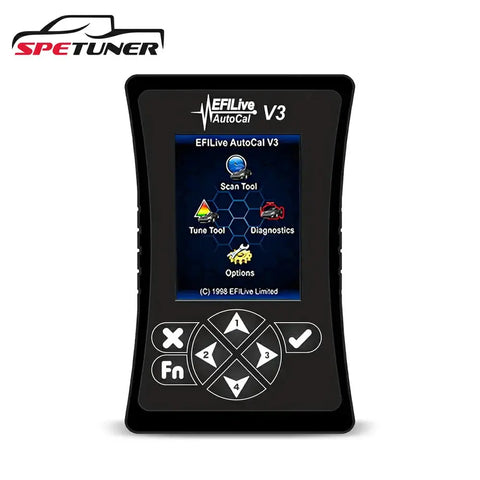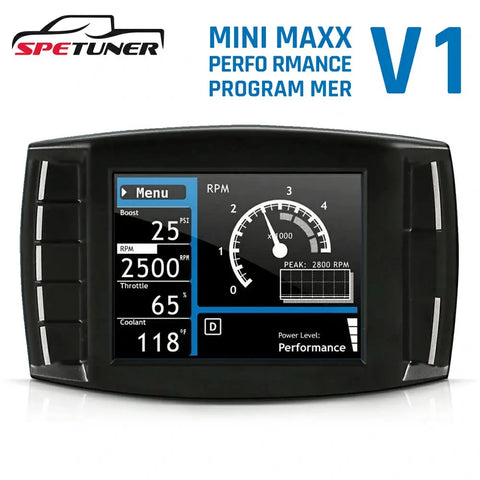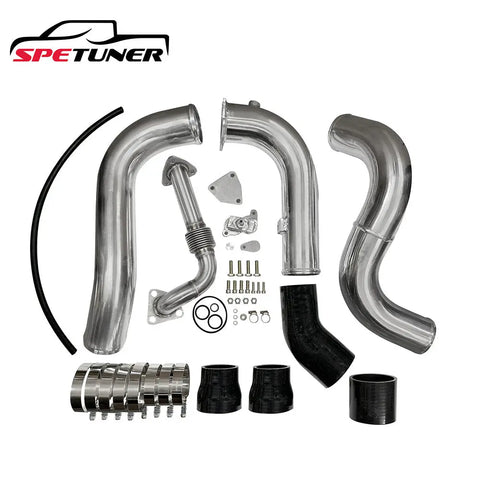If you're considering an EGR (Exhaust Gas Recirculation) delete on your diesel vehicle, one of the most critical questions you'll face is:
Whether I need a tune after deleting my truck?Short answer: Yes.
On modern diesel trucks like6.7 Powerstroke, 6.7 Cummins, and Duramax, an EGR delete usually needs a tune. Without a tune, you may get check-engine lights (P0401/P0402), rough idle, regen/backpressure issues, and even limp mode.
Understanding the EGR System and Its Role
Before diving into tuning requirements, it's important to understand what your EGR system does. The EGR system recirculates a portion of exhaust gases back into the engine's combustion chamber to reduce nitrogen oxide (NOx) emissions and lower combustion temperatures.

Your vehicle's Engine Control Unit (ECU) is specifically programmed to expect this system to be functioning. Every sensor reading, fuel injection timing, and air-fuel ratio calculation factor in the EGR's operation.
Why You Must Tune After EGR Delete
The ECU Still Expects the EGR System
When you physically remove or block off the EGR system without tuning, your ECU doesn't know the system is gone. It continues sending commands to valves and sensors that no longer exist or function. This creates several immediate problems:
Check Engine Lights and Error Codes: Your dashboard will illuminate with fault codes related to EGR performance, flow issues, and sensor malfunctions. These aren't false alarms—your ECU genuinely detects that something is wrong.
Limp Mode Activation: Many modern diesel engines will enter "limp mode" when EGR codes persist. This safety feature dramatically reduces engine power to prevent potential damage, leaving you with a vehicle that barely performs.
Incorrect Air-Fuel Ratios: Without a tune, your engine continues operating with fuel maps designed for recirculated exhaust gases. This leads to improper combustion, potentially causing poor performance and increased fuel consumption.
Performance and Efficiency Suffer
An untuned EGR delete doesn't just trigger warning lights—it actively hampers your engine's potential:
- Wasted potential: You've removed a restrictive emissions component but haven't optimized the engine to take advantage of the cleaner air intake
- Incomplete combustion: Fuel delivery remains calibrated for a system that no longer exists
- Power losses: Instead of gaining horsepower, you may actually experience reduced performance
Long-Term Engine Damage Risks
Operating with an untuned EGR delete can cause serious damage over time:
- Carbon buildup: Improper air-fuel mixtures can increase carbon deposits
- Increased exhaust gas temperatures (EGTs): Without proper tuning adjustments, EGTs may rise to dangerous levels
- Turbocharger stress: Incorrect boost pressures can reduce turbo lifespan
- Engine knock: Poor combustion timing can cause damaging detonation
What Does an EGR Delete Tune Do?

A proper EGR delete tune reprograms your ECU to:
- Eliminate error codes: Disables EGR-related fault monitoring so your check engine light stays off
- Optimize fuel delivery: Adjusts injection timing and duration for the new airflow characteristics
- Recalibrate boost pressure: Modifies turbocharger operation for maximum efficiency without EGR
- Adjust air-fuel ratios: Ensures optimal combustion with clean intake air
- Set appropriate EGT limits: Protects your engine from excessive temperatures
- Maximize performance gains: Unlocks the full potential of your EGR delete
Legal Considerations You Must Know
Important legal disclaimer: EGR delete is illegal for on-road vehicles in the United States under the Clean Air Act and in many other countries. Removing emissions equipment:
- Violates federal EPA regulations
- May violate state and local laws
- Can result in significant fines
- Will cause your vehicle to fail emissions testing
- May void manufacturer warranties
EGR deletes are legal only for off-road, competition, or agricultural vehicles that are never operated on public roads. Always check your local regulations before modifying emissions systems.
Can You Drive Without a Tune After EGR Delete?
Technically, yes—your engine will start and run. But should you? Absolutely not.
What Happens If You Don’t Tune After a Delete?
Here's what you'll experience:
- Constant check engine lights
- Possible limp mode
- Poor fuel economy
- Reduced power output
- Potential engine damage
- Failed emissions tests (where applicable)
- Possible warranty issues
Some people attempt to simply clear the codes repeatedly, but this is a temporary band-aid that doesn't address the underlying calibration issues.
Choosing the Right Tune for Your EGR Delete
Custom vs. Canned Tunes
Custom tunes are created specifically for your vehicle based on its modifications, usage, and your performance goals. They offer the best results but cost more.
Canned (off-the-shelf) tunes are pre-programmed for common vehicle configurations. They're more affordable and work well for standard EGR deletes without other major modifications.
Reputable Tuning Companies
Research companies with proven track records in diesel tuning. Look for:
- Positive customer reviews
- Experience with your specific make and model
- Dyno-proven results
- Good customer support
- Regular software updates
Tuning Methods
You'll typically choose between:
- Handheld programmers: Plug into your OBD-II port for easy installation
- Custom ECU flashing: Professional reprogramming for optimal results
- Piggyback modules: Intercept and modify sensor signals (generally less recommended)
How to Tune After EGR Delete?
SPETUNER offers high-performance EGR delete kits, including Powerstroke EGR delete kits, Cummins EGR delete kits, and Duramax EGR delete kits, along with tuning solutions for post-delete vehicles. Below are the recommended tuning tools and how-to guide.

Vehicle Fitment:
- Dodge RAM Cummins 5.9L, 6.7L (2006 - 2012)
- Ford Powerstroke 6.0L, 6.4L & 6.7L (2003 - 2016*)
- GM Duramax 6.6L LMM (2007-2010)
- GM Duramax 6.6L LML (2011-2014)
How to Use Mini Maxx V1 Tuner After EGR/DPF Delete
To tune your diesel truck's ECU after an EGR/DPF delete, follow these steps:
- Install the Mini Maxx V1 Tuner by connecting it to your vehicle’s OBD-II port and powering it on.
- Select the appropriate tune based on your truck's engine model and delete configuration.
- Upload the tune to your ECU and monitor engine performance using the Mini Maxx V1's real-time data feature.
- Check for error codes and ensure the new tune is successfully applied without any issues.
For a detailed step-by-step guide on installing and tuning with the Mini Maxx V1, visit our full guide here.

Vehicle Fitment:
- Dodge RAM 6.7L Cummins (2007.5 - 2021)
- Ford Powerstroke 6.4L (2008 - 2010)
- Ford Powerstroke 6.7L (2011 - 2019)
- GM Duramax LMM & LML 6.6L (2007.5 - 2016)
How to Use Mini Maxx V2 Tuner After EGR/DPF Delete
- Plug the Mini Maxx V2 into your truck’s OBD‑II port and connect the power harness (fuse‑tap or keyed‑ignition 12 V).
- With the ignition key in “On” (engine off), launch the tuner and go to “Change Vehicle” to select your truck’s make, model, and year — this ensures correct tuning files are loaded.
- From the main menu choose “Install Download” and follow on‑screen prompts: you may need to toggle the key “Off” → “On” when asked, but under no circumstances should you start the engine during the download.
- Once the tune is installed, replace any fuses removed during setup. Then start the engine and check for errors or abnormal behavior to confirm tuning applied successfully.
- After tuning, drive under normal conditions while monitoring engine performance (boost, temp, etc.). Mini Maxx V2 lets you switch between power levels (street / tow / performance) on the fly, giving flexibility based on usage.
For full step‑by‑step instructions and model‑specific notes, check out our complete Mini Maxx V2 installation guide.
The Complete EGR Delete Process
To do this modification correctly, follow this sequence:
- Research legality for your intended vehicle use.
- Choose quality delete components (EGR delete kit, block-off plates).
- Select a reputable tuner compatible with your vehicle.
- Physical installation of deleted components.
- Apply the tune immediately after installation.
- Monitor performance (EGTs, boost pressure, fuel consumption).
- Consider dyno testing to verify proper operation.

EGR Delete Kits — Shop by Engine (Powerstroke / Cummins / Duramax)
EGR delete kit
$398.00 USD
Buy NowCost Considerations
Budget for the complete package:
- EGR delete kit: $100-$500
- Installation labor: $200-$500 (if not DIY)
- Tuning: $400-$1,500 depending on custom vs. canned
- Total investment: $700-$2,500+
While it's tempting to skip the tune to save money, this is false economy. The potential engine damage from improper operation far exceeds the cost of proper tuning.
Benefits of Proper EGR Delete with Tuning
When done correctly with appropriate tuning, EGR delete can provide:
- Increased horsepower and torque: 20-40+ HP gains are common
- Improved fuel economy: 1-3 MPG improvements reported by many users
- Lower EGTs: Reduced exhaust temperatures extend engine life
- Reduced maintenance: No more clogged EGR valves or coolers
- Cleaner intake: Prevents soot buildup in the intake manifold
- Better throttle response: More immediate power delivery
Common Myths About EGR Delete Tuning
Myth: "I can just unplug the EGR and clear the codes."
Reality: Your engine will run poorly, and codes will return immediately.
Myth: "Tuning is only for performance gains."
Reality: Tuning is essential for proper engine operation after EGR delete.
Myth: "All tunes are the same."
Reality: Quality varies dramatically between tuners and tuning methods.
Myth: "I can add the tune later."
Reality: Driving without a tune risks engine damage and poor performance.
Final
You absolutely need a tune after an EGR delete. This isn't optional or something to add later—it's a fundamental requirement for safe, efficient engine operation. The ECU must be reprogrammed to account for the missing EGR system, optimize performance, and prevent damage.
If you're not prepared to invest in proper tuning, don't perform the EGR delete. The physical removal is only half the modification; the electronic recalibration is equally critical.
Remember to carefully consider the legal implications for your specific situation and always ensure your vehicle modifications comply with applicable laws and regulations. When done properly with quality components and professional tuning, an EGR delete can significantly improve your diesel engine's performance and reliability—but only when both the hardware and software are addressed correctly.
FAQs about Tuning After an EGR Delete
Do I need a tune after an EGR delete?
Yes for most modern trucks (6.7 Powerstroke, 6.7 Cummins, Duramax LML/L5P). The ECU expects EGR signals. Without a tune, you may get fault codes and limp mode.
Can I drive without tuning?
You might move the truck, but you’ll likely see check-engine lights, poor drivability, and reduced power. We don’t recommend it for off-road builds.
Will a tune help fuel economy?
It can, but results vary. A good off-road tune focuses on stable drivability, safe EGT, and matched airflow/fueling after the delete.
Is this legal on the street?
No. Emissions deletes are illegal for on-road use under federal law. Off-road/competition use only.
Which tuner should I choose?
Mini Maxx V1 is a simple, budget-friendly option. Mini Maxx V2 is a full bundle for off-road builds. Pick the one that fits your platform and goals.






